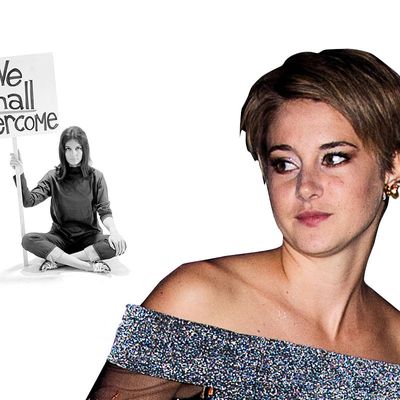
I was once Shailene Woodley. Well, by that I mean that I was once prone to saying, “I’m not a feminist, but …”
At the time, I was a gangly, sarcastic high-schooler in Iowa, not the star of a major Hollywood franchise. But like Woodley, though I had fiercely held beliefs that I would absolutely describe as feminist in retrospect, I was too insecure in myself and in those very beliefs to formalize them with a label. And I was in a conservative environment that had taught me feminists were ugly and hostile and unappealing to men — things I felt were already significant problems for me. Without a strong community of other people who embraced the term, I assumed — correctly, I think — that claiming it was all downsides, no benefits. Plus, I didn’t know much about feminism.
Woodley made a similar calculation. When Time asked her if she’s a feminist, she replied, “No because I love men, and I think the idea of ‘raise women to power, take the men away from the power’ is never going to work out because you need balance.”
Oof. Her answer is rooted in some rather dated misconceptions, and it unleashed a tsunami of feminist “I love men!” tweets. (It’s true. We do.) “Shailene Woodley Has Some Thoughts on Feminism, and They Are Not Good” blared the Jezebel headline.
True, Woodley’s claim that feminists are anti-men is “not good.” But the rest of the brief interview revealed some other beliefs that are actually pretty laudable. The Jezebel headline could have also accurately said, “Shailene Woodley Affirms the Power of Sisterhood.” Clearly she’s not an anti-equality crusader; she just knows more about negative feminist stereotypes than she does about feminism.
A little compassion is in order. Many proud feminists, like me, have an “I’m not a feminist” phase in their past. Just look at reigning pop-culture feminist queen Beyoncé: Mere months before she sampled Chimamanda Ngozi Adichie’s definition of feminism, Beyoncé told Vogue U.K., “I guess I am a modern-day feminist. I do believe in equality.” But she added, “Why do you have to label yourself anything?” Not exactly a rallying cry.
Once you’ve made the leap to calling yourself a feminist, it can be hard to accept the women who are sympathetic to the cause but who aren’t there yet. After I became a full-fledged adopter of the F-word in my college years, I joined the ranks of the feminist-membership police, scouring the pages of Bust for celebrities’ answers to the “Are you a feminist?” question, and feeling a minor betrayal every time one of them said anything but yes. When Björk replied “Umm … no” to the feminist litmus test in 2005, it killed me. But then again, that same year, Björk also said, “You go to the toy store and the female characters there — Cinderella, the lady in Beauty and the Beast — their major task is to find Prince Charming. And I’m like, wait a minute — it’s 2005!” Sounds like a feminist critique of pop culture to me.
The “Are you a feminist?” test is most often administered to young, female celebrities who have dared to challenge stereotypes or allude to their beliefs in gender equality. Interviewers never ask this question of male celebrities, and they rarely ask it of older women. And in the context of mainstream media, “Are you a feminist?” is not movement-building. It’s a trap. If young women say yes, tabloids and conservative pundits are quick to decry their perceived radicalism. And if they say no, they’ve got the feminist police to deal with. Usually, they take a middle ground: They decline the label but say a bunch of other smart things that make clear they’re quite aware of gender inequality and the need to remedy it.
Let’s stop and consider that maybe a brief interview with Time magazine is not the safest space for Woodley to explore complex ideas about gender, equality, and the pressure she feels to appeal to men — something that even proud feminists struggle to articulate. According to Time, “though many define feminism simply as equality between men and women politically, socially and economically, what constitutes the movement is up for debate among stars.” Actually, what constitutes the movement is up for debate among everyone, especially feminists. The difference is that stars often don’t have the luxury of having this debate in private.
It’s a privilege to feel secure enough to label yourself a feminist. I think of my shaky sense of self when I was in high school, and my conservative Catholic surroundings, and it makes total sense that I didn’t “come out” until I was nestled in the safe liberal bosom of college. I think of the countless women who have felt alienated by mainstream feminism’s race and class biases, and opted to reject the term altogether. I think of young celebrities like Shailene Woodley, who have more to lose by claiming feminism than they do by casually disavowing it. Correcting misconceptions about feminism is important, but implying these women are stupid or traitors for their decision not to embrace the term doesn’t make for a stronger feminist movement. It makes for fewer feminists.




